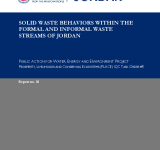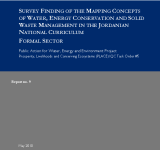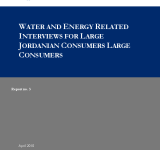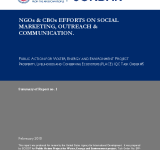The report studies the formal and informal waste streams in Jordan as well as the public behaviors and attitudes that influence them. The study gives a specific emphasis to discovering the “drivers” of these practices as well as barriers to change and aims to locate examples of model behavior that already exists in Jordan so that they can be encouraged and duplicated. It investigates and assesses the four areas – the general attitudes of the Jordanian population towards waste and waste disposal;; informal waste reclamation sector in Jordan;; stream of recyclable material and the formal sanitation and waste management system of Amman and Aqaba. This research was conducted as part of the Public Action for Water;; Energy and Environment Project (PAP);; which aims to encourage water and energy conservation and to support behavior change towards more conservation and efficient practices both at the household level and in the commercial;; industrial and civil society arenas using social marketing behavioral methods. The study finds that there were high levels of awareness and concern about issues such as littering and recycling but it also concludes that the lack of concern amongst the broader public was cited as one principal reasons that people were not taking action. It calls for a quantitative research to confirm Jordanian attitudes on environmental issues.
practices
The study aims to evaluate the concepts of water;; energy and solid waste that exists in the curriculum and the manner in which they are tackled by mapping the current textbooks based the three themes of the study – water;; energy and solid waste. The report is based on a comprehensive study of 104 school textbooks from grades 1 – 10 in fourteen subjects. The survey finds that the environmental education concepts were vastly covered in all subjects of he study in a total of 1777 concepts;; and most of them focused on scientific facts and information with repetitive energy concepts and lack of sequential flow. This research was conducted as part of the Public Action for Water;; Energy and Environment Project (PAP);; which aims to encourage water and energy conservation and to support behavior change towards more conservation and efficient practices both at the household level and in the commercial;; industrial and civil society arenas using social marketing behavioral methods. Based on the finding that there is little space allocated to the synthesis and application of information and knowledge and therefore the concepts remain superficially tackled;; the report recommends that support material should be prepared for the different grade levels and training programs should be developed for the teachers as real agent of change and role models.
The report aims to better understand and quantify the attitude and the levels of awareness amongst large consumers of water and energy;; and it presents the findings of the interviews conducted with a representative sample of large consumers to better understand trends and behaviors related to water and energy consumption. The research was conducted as part of the Jordan Public Action in Water;; Energy;; and Environment Project (PAP) under the Prosperity;; Livelihoods;; and Conserving Ecosystems (PLACE);; which aims to initiate and establish clear and identifiable behavioral changes amongst the Jordanian public and decision-makers. The study categorizes large consumers into a number of main sectors including hotel and restaurant sectors;; commercial sector;; hospitals;; government buildings and industrial sector;; and the field surveys were collected as a random sample of different industries;; state and commercial buildings. The research finds that the majority of large consumers neither monitor their water nor their energy consumptions via sub-metering scheme;; showing that the majority of large consumers are not able to accurately determine the areas within their establishments that are the most consuming. This finding identifies four major obstacles in implementing the water and energy saving practices including;; lack of awareness;; lack of incentive programs amongst employees;; higher prices for higher quality savings devices and lack of proper maintenance.
The report is based on the findings of the survey that was designed to review NGO/CBO experience in communication/outreach and assess the capability of individual staff in the relevant NGOS and CBOs. The primary goal of the project is to institutionalize social marketing practices in NGOs and CBOs;; because organizations in the forefront of development depend on their ability to reach target groups and remove barriers to change. The research was conducted as part of the Public Action in Water;; Energy;; and Environmental Project to initiate and establish clear and identifiable behavioral changes amongst the Jordanian public and decision-makers;; to lead to increased efficiency in the use of water and energy;; and to improve solid waste handling practices. The main findings of the research identify sources of funds and grants of the NGOs;; their major activities and partnerships. The report also suggests training for successful fundraising;; social marketing and media campaigns for the NGOs and continued surveys and interviews of the NGOs.



